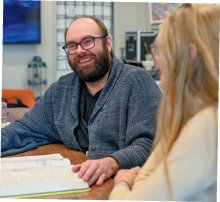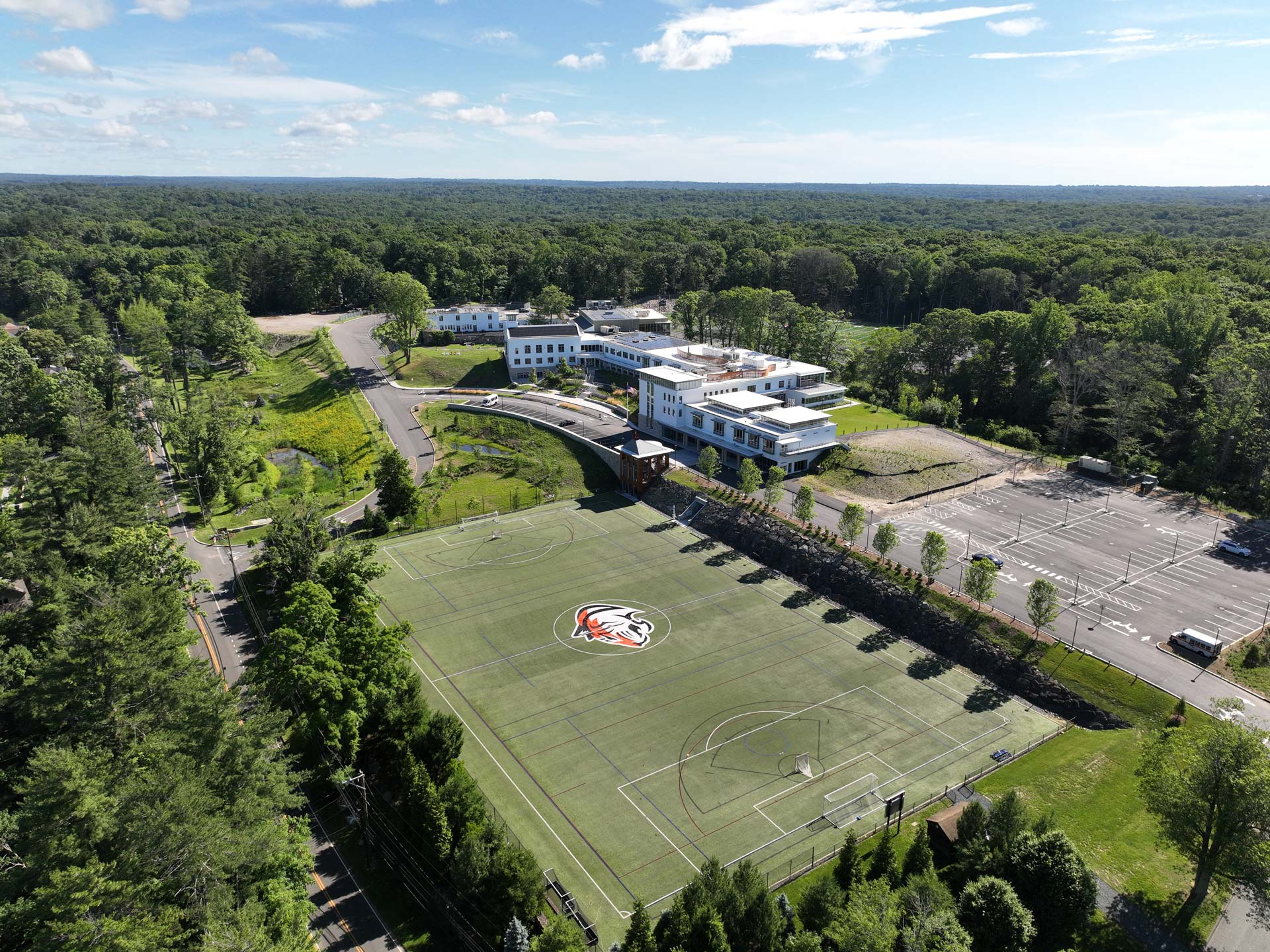
BY ANDREW NIBLOCK, Director of Schoolwide Initiatives
Talking with Coleman Hall about numbers is like getting to talk with Indiana Jones about the lost ark. Coleman believes in the adventure of mathematics, and he is determined to bring the students of our Upper School with him. He invites his students to unravel the mysteries of math, connect their lessons to the world, and fall in love with numbers.
It is said that math is a universal language, one through which we might be better able to communicate with our universe, and Coleman wants our students to “hear her whispers.”
When did you fall in love with numbers?
I remember my first fascination with them while grocery shopping with my grandmother during the summer months. She would always keep me busy adding up the running total to predict the final cost. I learned quite a bit of “number sense” and started to develop the little tricks to add or subtract more efficiently. My love for understanding how these little creatures behaved continues to grow, and I remember those moments with my Gran fondly, for many different reasons now.
What about math inspires you?
If we operate under the assumption that math is the “language with which the universe speaks,” then I find it incredibly inspirational that this language allows me to understand the world around me better. I love the problem-solving aspects of math. Although most people would think of math as incredibly concrete, there are a myriad of mysteries yet to be solved. I feel a pioneering spirit when thinking about math, and although I don’t get to chart undiscovered waters or planets, I get to live with these complex ideas for discovery in the comfort of my own home sitting on a couch while knitting. That’s really cool to me.
How do you hope students enter your classroom?
In the words of Mr. Rohdie, I hope my students enter the classroom with kindness towards their peers, myself, and themselves. Math is a vulnerable subject. You will make mistakes and find misunderstandings and confusions along the journey. Being honest about one’s understanding helps me and the individual navigate that problem together. I hope my students come in optimistic and ready to learn. Having a great sense of humor helps make some dry topics go by more enjoyably, too.
How do you hope students leave your classroom?
I hope they leave feeling confident in their math ability, and if they don’t know an answer, I want them to have the tools to find and interpret the answer from their research. I hope they feel seen, supported, and brave leaving our classroom space. Most importantly to me, I hope that they understand that numbers can represent ideas and humanity in a distant way, so when they encounter a stat or result, I want them to think about what story the number is telling. Finding the humanity within these complex systems that are described by numbers is something I pontificate about often.
What is something we all should learn, or unlearn, about mathematics?
“I am not a math person.” “I hated math in school.” “I love math because it has a definite answer, and I can know when I am right.” These are some quotes I wish people wouldn’t use. It influences children, from my experiences. These students look up to their families. You can be honest about not being the best at math, but it goes a long way to encourage children to persist through the setbacks. People don’t brag about “hating reading” or make comments to the idea of “Shakespeare, when is this applicable in my life? Who needs that?” Math is more than numbers and operations. It’s hard, and it takes time to develop the skills and mental dexterity to be decent at it. Folks are on their own unique journey in math. Don’t compare your journey to someone else’s. You will get there if you put in the work.
Why is math important for kids?
Biologically, math helps develop both deductive and inductive reasoning. It develops language processing skills, especially when we need to translate words into math language. Having students explain their reasoning to each other and to their teachers prepares them for defending their stances in their futures. The transference of skills that math teaches reaches far beyond the quadratic formula.
What is the journey like for GCDS mathematicians? What makes it amazing?
Your child will be known and seen in our program. We don’t make predictions about your child’s ability in early grades and set them on pathways. There are many opportunities for students to work and achieve their goals in math. By the time they graduate, we hope that every student has a visceral connection to the importance of math, and also a solid foundation for their college preparation. Instead of following the traditional lecture/worksheet/assess . . . repeat model, we like to create opportunities for students to explore concepts at deeper levels, often self-directed. Ms. Iversen has a delightful project on conic sections in Honors Precalculus. We had students connect the mathematical ideas to medical imaging and kidney stone removal devices and also to hyperbolic gears for conveyor belts and sorting factories. These explorations allow the students to see the language of our universe in action. After all, we want our students to be able to hear her whispers.
What does GCDS math look like at the highest levels?
We offer some advanced courses that go beyond a typical curriculum. We have offered the math of sustainability. We have an advanced statistics and a statistics elective. We have had some students pursue math topics for their junior thesis. One student wrote about Fractional Calculus. Another wrote about Differential Equations and their applications to real-world phenomena. If a student exhausts the curriculum, we have some Advanced Seminar topics where they work with myself or another teacher on a deep dive into mathematical theory in branches beyond calculus. Such courses include Linear Algebra, Number Theory, Proof Writing, Combinatorics, and others.
Why is math the subject of angst in so many school communities? Should it be?
Unfortunately, and rightfully so, math has been branded as a gatekeeping subject, especially for the college process. That’s the perception I hear all of the time. I wish I could say that this 100% isn’t the case. I wholeheartedly desire for math to be seen as more than this. With this added pressure, I would argue that many of our students don’t see or appreciate the full scope of what math has to offer to their lives because they are worried about the grade. This also creates a false perception of one being a “math person or not.” I think anyone can learn this math with time, patience, and practice. Sadly, we don’t have enough time in a day with all of the other activities that fill our lives from other subjects, to service work, to athletics, etc. . . . Families have their own perceptions and realities about their math experiences. I find that these often pass into the child by transference. If I go to a doctor, dentist, or any other professional who has had to intersect with math, and when I tell them that I teach math, I ALWAYS have the privilege of hearing one of their many horror stories about how their math teacher scarred them in school. I wish this wasn’t the case, and it certainly isn’t who we are as math educators here. GCDS really found a wonderful group of engaging and creative math teachers. We want our students to experience success to the highest degree possible while they are with us.
I obsess about the day that our students take their first college math test. We want them ready and prepared. In as much, Honors math may not be appropriate for them yet, but it can be some day. I know this causes some angst in folks. That angst can cause some folks to be defensive, and I wish it were not the case. Ultimately, we want to create the experience and pathway towards mathematical understanding. I was not an Honors math student, yet I have advanced degrees in theoretical mathematics. I got there eventually. I hope that parents will give children patience and space to grow.
Why do you teach?
This has changed for me throughout my years teaching and as I have aged. At the end of the day, I love it, and it is so wild for me to think that I get to wake up each morning and talk about a subject I love with some incredibly awesome students and people. What a great way to spend the day!
I wish teaching were this simple . . . I am patient. I am gentle. I am not afraid to sit in silence while someone thinks. I give compliments often, but I am also quick to pull someone back towards the direction of best growth. I find joy and purpose in helping students navigate a tough subject during some incredibly tough years of their lives.
The students often ask me what I would do if I didn’t teach. I can honestly say that there is nothing else I would rather do.














.JPG&command_2=resize&height_2=85)





